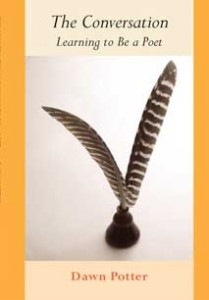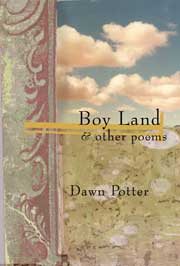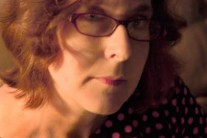The Conversation: Learning to Be a Poet;
318 pages; 6 x 9 in. $27.50
Available now at a discount, $5 off includes shipping.
Filling a niche that has long been neglected, The Conversation addresses issues of both writing and close and considered reading. Chapters focus on specific elements of poetic language and structure and offer writing exercises--which include both poetry and personal essays--that link directly to the featured works and the accompanying discussions.
Dawn Potter directs the Frost Place Conference on Poetry and Teaching, held each summer at Robert Frost’s home in Franconia, New Hampshire. She is the author or editor of seven books of prose and poetry. Same Old Story, her most recent poetry collection, is a nominee for the 2014 Los Angeles Times Book Award for Poetry. Her memoir, Tracing Paradise: Two Years in Harmony with John Milton, won the 2010 Maine Literary Award in Nonfiction; and she has also received grants and fellowships from the Elizabeth George Foundation, the Writer’s Center, and the Maine Arts Commission. New poems and essays appear in the Beloit Poetry Journal, the Sewanee Review, the Threepenny Review, and many other journals in the United States and abroad.
In addition to writing, editing, and teaching, Dawn sings and plays fiddle with the band Doughty Hill. She lives in Harmony, Maine, with photographer Thomas Birtwistle and their two sons. For more about Dawn and her work, visit her blog.
For more about The Conversation.
Dawn Potter crafts a beautiful and compelling lesson in “The Conversation: Learning to Be a Poet”
By Amy Rasmussen on December 23, 2015
Format: Paperback
Dawn Potter crafts a beautiful and compelling lesson in “The Conversation: Learning to Be a Poet:: Yes, you can. Within the text we find references to poets, snippets of poems, full-length poems, and practical yet beautifully written instructions on how to let poetry seep into our souls and fly out of our fingertips. Potter’s sentences sizzle as she teaches the emotional importance of what poetry is –and does– for us, and how we can invite students into this emotion.
Potter writes: “If you’re a teacher, you know all too well how emotional your students can be. No doubt, as you’ve watched them work to express those emotions in writing, you’ve also noticed how often they feel obliged to sum up their emotional chaos with a pat conclusion — sometimes a moral epigram, sometimes a cynical shrug. In essence, they swerve away, using words to slam the door on chaos rather than allowing it to rule the poem. I think many of us succumb to a similar urge whenever we feel ourselves struggling to come to terms with, or simply articulate, the enormous, engulfing, unavoidable losses and desires that define the human condition. We want to find answers even as we run away for the questions.”
The Conversation is more than just a book about teaching poetry. It is a book about living, enjoying, hoping, discovering, and proving. Proving the humanity in each of us as we study the work of poetic greats: Shakespeare, Dickinson, Shelley, Hopkins and learn to write as they wrote.
Never did I imagine I would read about book about teaching poetry and fall deeply in love with the author’s language. Potter’s prose is as enticing as her poetry and as inviting as her message. I a better teacher and a better individuals because I have read this book. This book is a must read for any teacher who believes in the power of language to change the world for the better. You’ll find more strategies and poetry resources in this book than in any literature textbook, old or new, and these come straight from the mind of a living poet. Now, that’s some primary resource.



One thought on “The Conversation: Learning to Be a Poet”
Comments are closed.